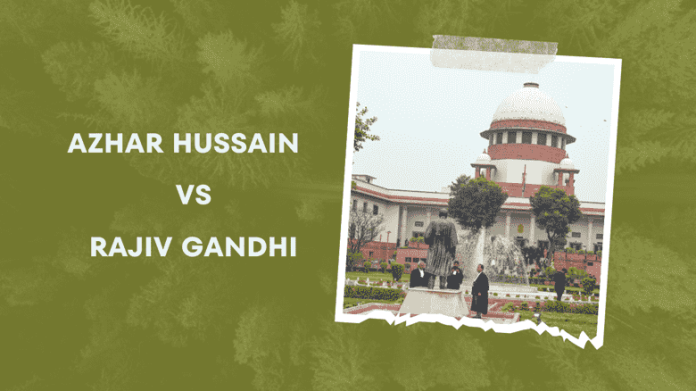Azhar Hussain vs Rajiv Gandhi, 1986
Introduction
The case of Azhar Hussain v. Rajiv Gandhi,1986 primarily involves the application of Order 7 Rule 11 of the Code of Civil Procedure (CPC), which allows for the rejection of plaints that do not disclose a cause of action or are otherwise defective.
Facts
Rajiv Gandhi was elected as a Member of Parliament from the Amethi constituency in the 1984 general elections. Azhar Hussain, an elector from the same constituency, filed an election petition challenging Gandhi’s election, alleging corrupt practices. Specifically, the petition claimed that Gandhi’s agents had used communal slogans and derogatory remarks against Maneka Gandhi, another candidate, to influence voters.
Issues
The central issue was whether the election petition filed by Azhar Hussain disclosed a sufficient cause of action under Order 7 Rule 11 of the CPC, warranting a full trial. Rajiv Gandhi contended that the petition lacked the necessary material facts and particulars as required by Section 83 of the Representation of the People Act, 1951.
Arguments
For Azhar Hussain:
- Requirement of Material Facts: The petitioner’s counsel argued that the election petition should not be summarily dismissed and that the court should proceed with a full trial to examine the evidence.
- Legislative Intent: It was contended that the legislature provided for summary dismissal only in cases of non-compliance with Sections 81, 82, and 117 of the Representation of the People Act, not Section 83.
For Rajiv Gandhi:
- Deficiency in Material Facts: The respondent’s counsel argued that the petition was deficient in material facts, failing to provide specific details such as the names of individuals involved in the alleged corrupt practices, the dates, and locations of the incidents.
- Justification for Summary Dismissal: It was argued that the court has the power to summarily dismiss a petition under Order 7 Rule 11 of the CPC if it does not disclose a cause of action, to prevent frivolous litigation from wasting judicial resources.
Judgment on Azhar Hussain vs Rajiv Gandhi, 1986
The Supreme Court upheld the High Court’s decision to dismiss the petition. The Court emphasized that under Order 7 Rule 11 of the CPC, a plaint can be rejected if it does not disclose a cause of action or is otherwise deficient in material facts. The Court ruled that the petition filed by Azhar Hussain lacked specific details necessary to constitute a cause of action. The petition did not provide the names of individuals involved in the alleged corrupt practices or specific instances of such practices. As a result, the petition was deemed insufficient and was dismissed at the threshold.
Conclusion
The Azhar Hussain v. Rajiv Gandhi,1986 case underscores the importance of detailed and comprehensive pleadings in election petitions. It highlights the application of Order 7 Rule 11 of the CPC, emphasizing that courts should summarily dismiss petitions that do not disclose a cause of action to conserve judicial resources and prevent frivolous litigation. This case serves as a key reference for understanding the requirements of pleadings and the exercise of judicial discretion under the CPC
Also Read:
Rights of undertrial prisoners in India
How To Send A Legal Notice In India



